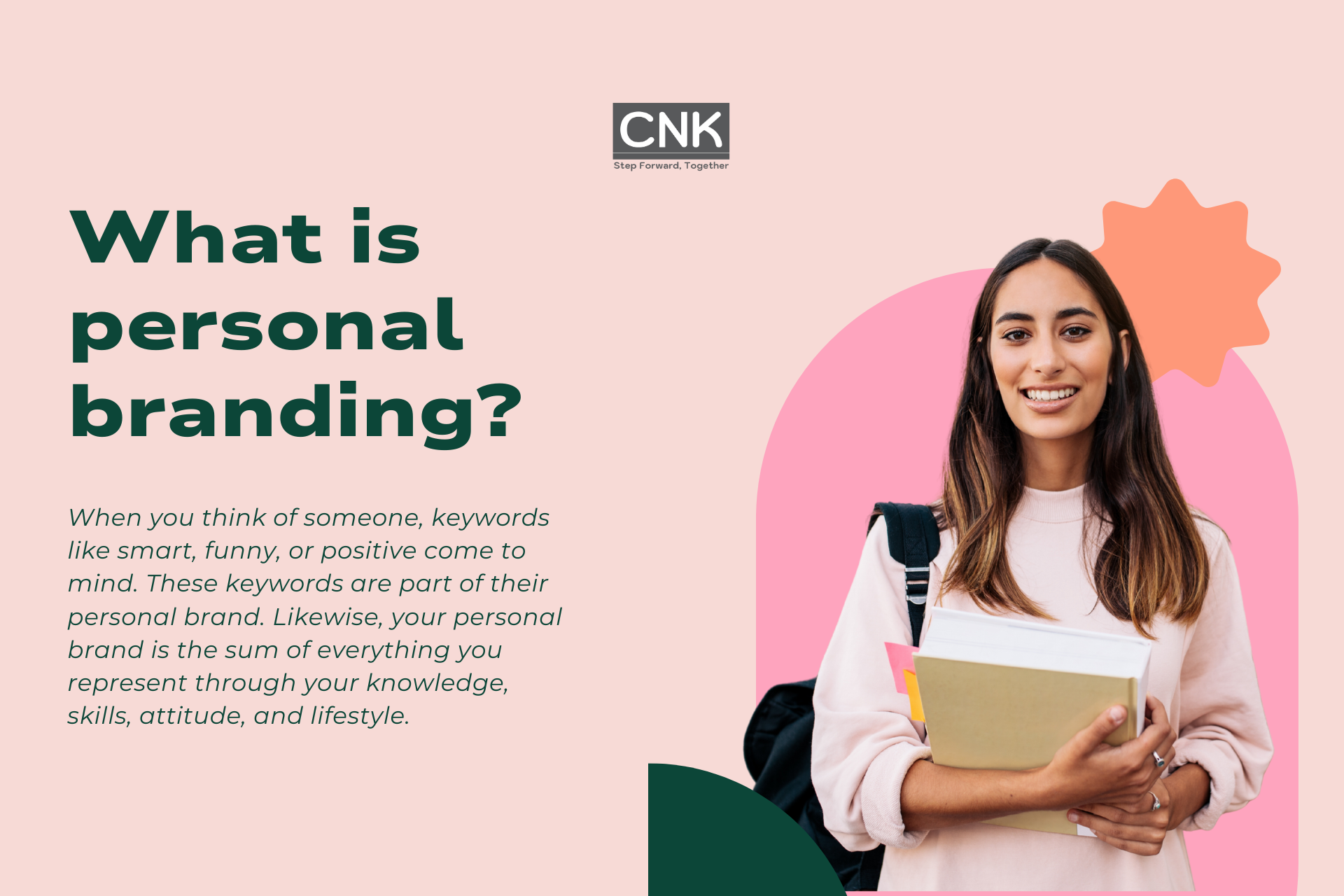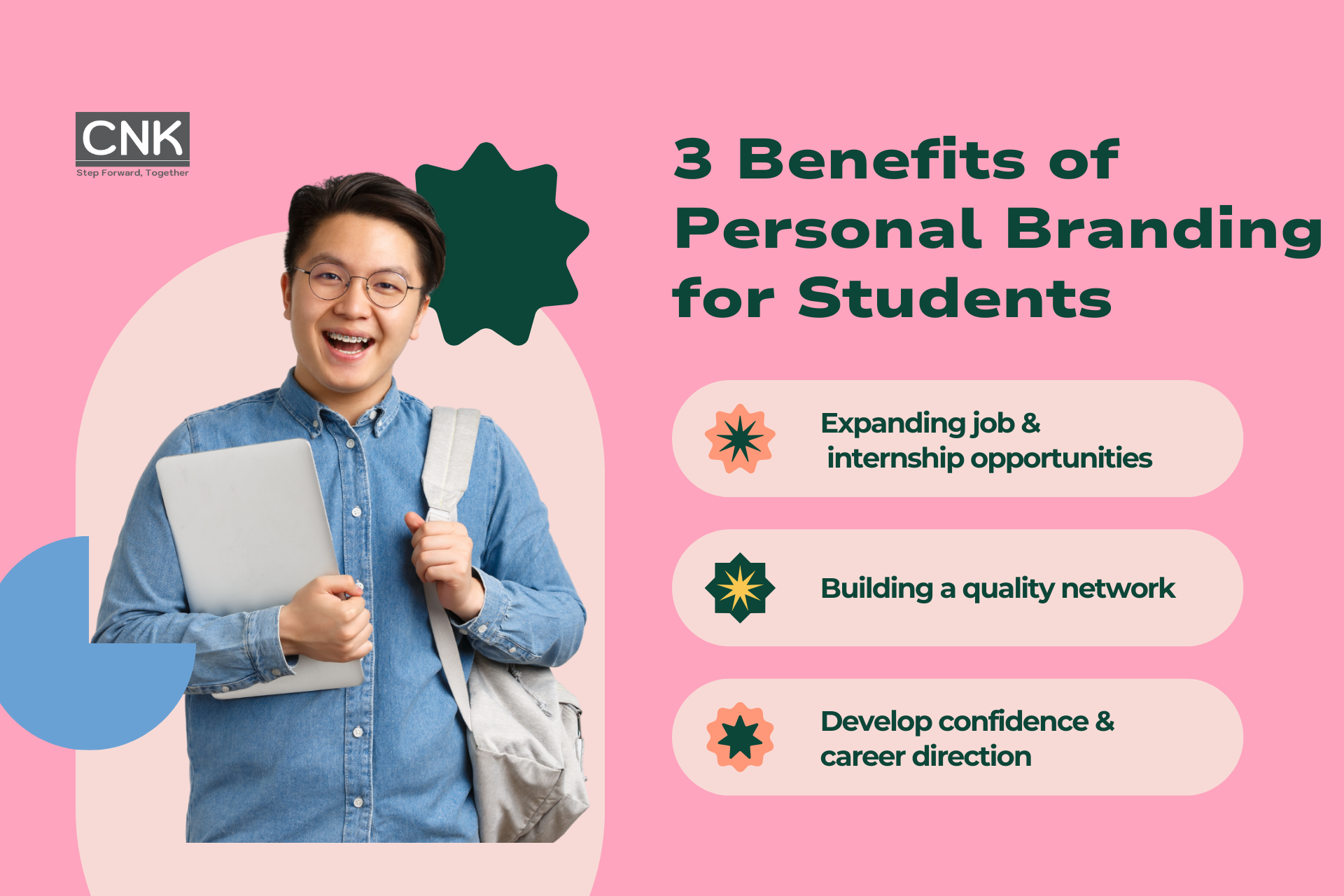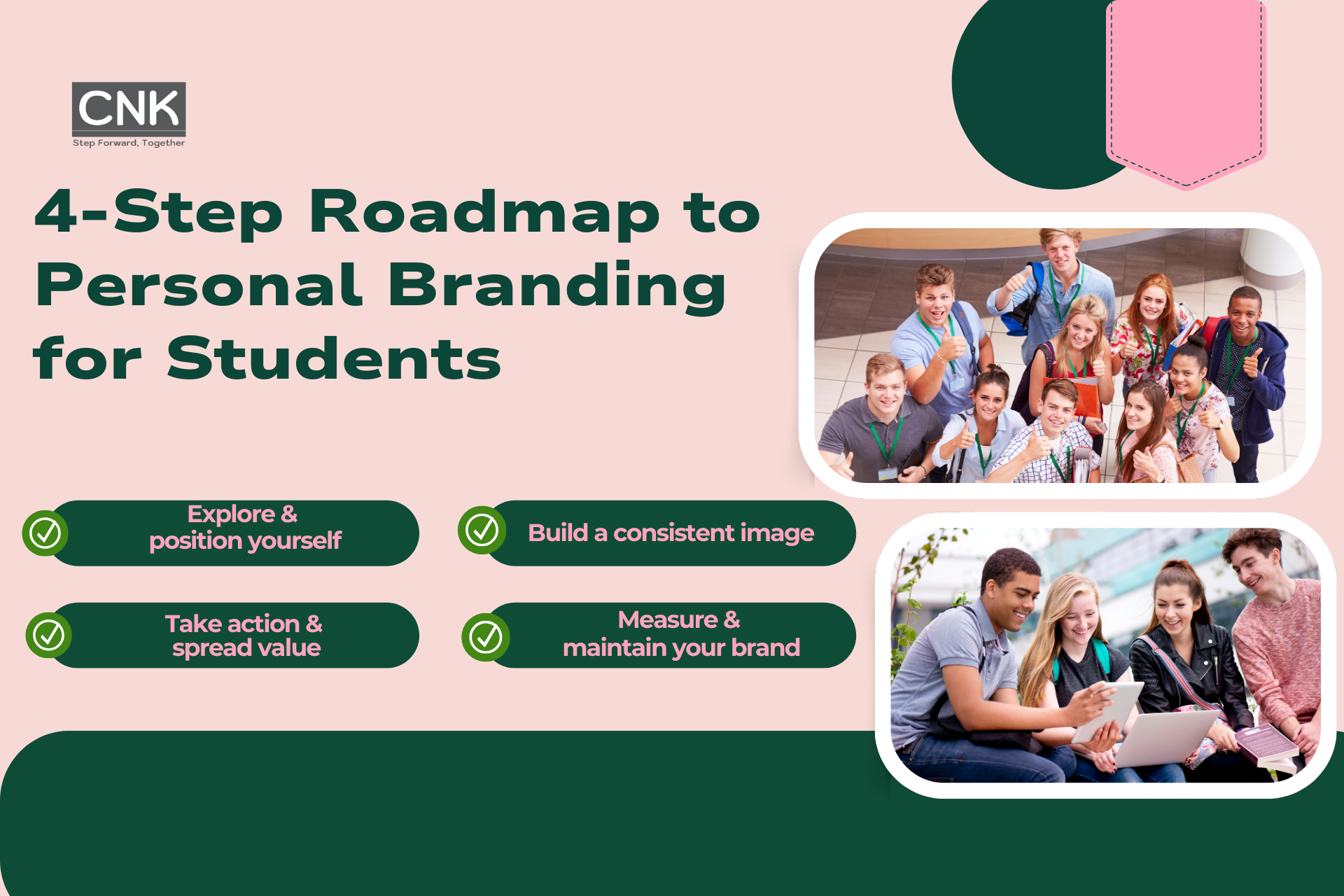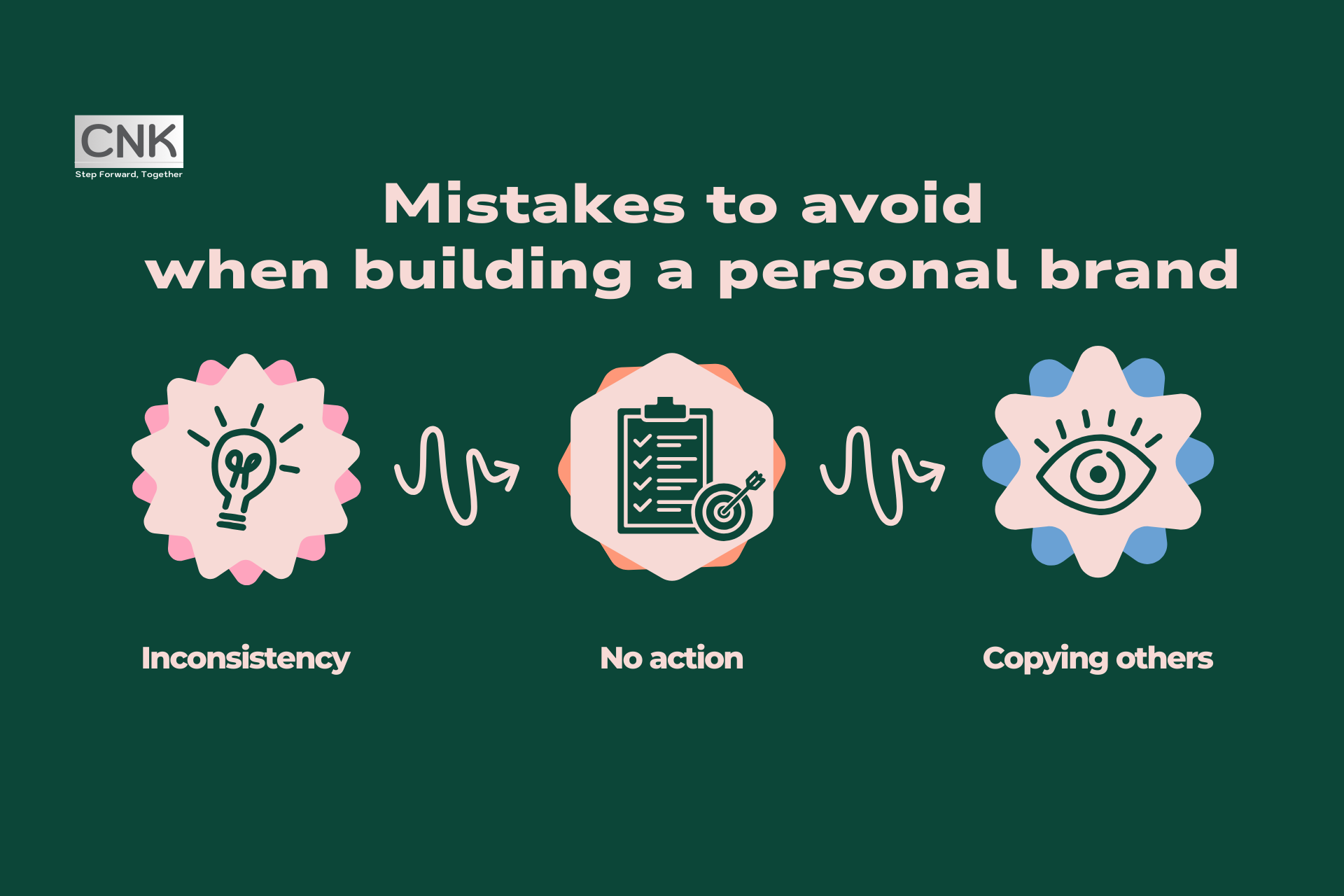Personal branding for students is the key to affirming your value from the very first steps. It not only supports your academic and extracurricular journey but also serves as a solid foundation to impress employers and expand career opportunities after graduation.
Table of Contents
Personal branding for students: What it means and why you should build it
What is personal branding?
Many people still mistakenly think that personal branding is something far away, only for famous people or successful businessmen. In fact, personal branding is simply how others think of you when you are not there.

When you think of someone, keywords like smart, funny, or positive come to mind. These keywords are part of their personal brand. Likewise, your personal brand is the sum of everything you represent through your knowledge, skills, attitude, and lifestyle.
That’s why personal branding is so important. With thousands of students graduating each year, a strong personal brand will help you stand out, make a positive impression, and assert your own value.
3 Core Benefits of Building a Personal Brand as a Student
You may ask yourself: “I am just a student, have no experience, what is the point of building a personal brand?” This is the time for you to create your competitive advantage. Starting early brings the following 3 core benefits:

Expanding job and internship opportunities
In an increasingly competitive job market, a beautiful CV is not enough, because today’s employers are not only interested in scores but also want to see the difference in each candidate. A strong personal brand on platforms such as LinkedIn or personal projects is living proof of your ability and initiative. This makes it easier for you to catch the eye of companies and increase your chances of getting an interview or internship.
Building a quality network
Your personal brand helps you attract people who share your vision and goals. When you demonstrate your professionalism and value, you can easily connect with professionals, successful alumni, and industry influencers. This network will not only open up more opportunities for you, but will also be a valuable resource for you to learn from, seek advice from, and receive support as you progress in your career.
Develop confidence and career direction
The process of building a personal brand forces you to look at yourself and answer the questions: “Who am I?”, “What do I want to do?”, “What are my strengths/weaknesses?”. By discovering and developing your core values, you will understand yourself better, thereby building confidence and having a clearer career path. This is a journey of self-improvement that helps you constantly progress and grow.
Current situation and common challenges when students build personal brands
More and more students are realizing the importance of personal branding in their job search journey. According to a 2024 survey, up to 70% of employers believe that personal branding on online platforms directly affects their decision to select candidates, while only about 35% of students are confident that they have built a clear personal image. This shows a large gap between market requirements and student preparation.
Some common challenges that students often face:
- Lack of self-awareness: Many students have not clearly identified their strengths, outstanding skills and core values.
- Lack of practical experience: Due to the lack of projects, extracurricular activities or related jobs, demonstrating abilities is difficult.
- Inconsistent image: Personal profiles on LinkedIn, CV, and social networks are inconsistent, confusing employers.
- Psychological barriers: Fear of being judged or lack of confidence makes students reluctant to share their opinions, experiences or personal products.
- Limited digital skills: Not knowing how to take advantage of tools such as Online Portfolio, Blog or video to enhance professional image.
These realities and challenges make many students with good abilities “obscure” in the eyes of employers. Therefore, equipping them with knowledge and building a personal branding strategy while still in school is a decisive factor in helping students grasp future career opportunities.
4-step roadmap to building personal brands for students
To build an effective personal brand, students need a clear and systematic approach. The four-step roadmap below will act as a compass, helping you gradually define yourself, develop your image, spread your values and maintain a sustainable brand.

Step 1: Explore and position yourself
Before you build anything, you need to know where you are and where you want to go. This is the most important step, it will help you have a solid “compass” for the whole journey.
- Identify your core values and passions: Ask yourself these guiding questions: “What are you best at? What are you passionate about?” The answers will help you figure out what field you want to pursue, and then focus on developing related skills.
- Strengths and Weaknesses Analysis (SWOT Model): An effective tool to help you have a comprehensive view of yourself in 4 aspects: Strengths are your outstanding abilities or skills such as: logical thinking, foreign language ability or teamwork; Weaknesses are your limitations such as lack of practical experience, poor time management skills or lack of confidence when presenting; Opportunities come from the external environment such as student exchange programs, internship opportunities, research competitions or social networking platforms for knowledge sharing; Threats are barriers such as fierce competition, higher recruitment requirements or rapidly changing career trends. A full analysis of these four factors helps you understand your current position, know how to promote strengths, improve weaknesses, take advantage of opportunities and prepare for possible difficulties.
- Find your point of difference: What makes you special among thousands of students with the same major? It could be a combination of factors: an outstanding soft skill, experience working on a unique project, or even a special hobby related to the job. This point of difference is your unique “signature.”
Step 2: Build a consistent image
Once you understand yourself, it’s time to turn your core values into concrete images that demonstrate professionalism from the inside out.
Offline Image: Manners, communication and soft skills
Personal branding doesn’t just exist on social media. First impressions matter in face-to-face meetings.
- Professional demeanor: Whether you are attending an interview or a workshop, always pay attention to your attire and demeanor. Appropriate attire, a confident attitude, and polite communication will create a good impression on others.
- Essential soft skills: This is the “secret weapon” that helps you stand out from the crowd. You need to practice presentation skills to convey ideas clearly, teamwork skills to promote your role well, and problem-solving ability to handle all situations.
Online Image: Optimizing digital platforms
The digital world is where you express your professional “personal identity” to the world.
- LinkedIn: An indispensable platform, your first professional profile. Think of LinkedIn as an online CV that is always updated daily and regularly. You should write an impressive summary, describing your experience, projects you have participated in and your skills. Don’t forget to ask for recommendations from lecturers or colleagues to increase your credibility.
- Facebook/Instagram: You don’t have to be too serious on these platforms, but make sure your posts are positive and relevant. You can share helpful articles, join in professional discussions, or simply post photos of your extracurricular activities to make a personal statement.
Step 3: Take action and spread value
Building a personal brand is not just about what you say, but more importantly, what you do. This is the stage where you turn theory into action, creating specific products to demonstrate your ability.
- Participate in extracurricular activities: Clubs, volunteer projects or academic competitions not only provide knowledge but also provide an ideal environment for you to practice soft skills, get to know many people and demonstrate your initiative. Choose activities related to the industry you are pursuing to create a professional mark.
- Contribute to real-world projects: Be proactive in finding opportunities to apply your classroom knowledge to real-world situations. This could be a small research project, a freelance job, or an internship to gain experience. These experiences will not only enhance your CV but also create real-world stories to share.
- Create useful content: This is an effective way to demonstrate your knowledge and expertise. You can blog about a topic you love, vlog about your learning experiences, or contribute articles to specialized forums. This helps you establish yourself as someone who is knowledgeable and willing to share.
Step 4: Measure and maintain your brand
Personal branding is not a destination but a continuous journey. To develop your personal branding sustainably, you need to learn to listen and constantly improve yourself.
- Monitor your visibility: Update your LinkedIn profile, online CV or personal portfolio regularly. Pay attention to views, interactions or feedback from friends, teachers, employers.
- Get feedback from others: Be proactive in asking for feedback from people around you, such as friends, teachers, or mentors. Honest feedback will help you see what you do well and where you need to improve.
- Keep up to date: The world is constantly changing and so is your knowledge. Always learn new skills, stay up to date with industry trends and broaden your horizons.
- Persistence: Building a personal brand requires persistence over a long period of time. It is important that you maintain the habit of updating, sharing value and learning continuously.
Mistakes to avoid when building a personal brand
Many students make common mistakes in their personal branding journey that can derail their efforts. Understanding these mistakes will help you stay on track:
- Inconsistency: This is one of the most common mistakes students make. One day you present yourself as a serious, professional person on LinkedIn, but the next day you post inappropriate content on Facebook. This inconsistency will make others doubt who you really are, and will damage your personal brand.
- No action: If you just keep saying “I want to be…”, “I am passionate about…”, but don’t have any projects or achievements to prove it, your personal brand will only remain in theory. A strong personal brand will be built on real achievements.
- Copying others: Don’t try to be a copy of anyone. Copying will take away your uniqueness and prevent you from making your own mark. You can learn and get inspiration from others, but always build your brand based on your own values and differences.

Conclusion: Start Today – Invest in Your Future
Personal branding for students is not an overly complicated journey. What truly matters is avoiding common mistakes, maintaining consistency, and showcasing your authentic value. By starting with small actions such as updating your personal profile, joining a real-life project or sharing your perspectives on social media, you are gradually shaping your professional image.
Every step you take today is an investment in your future. A strong personal brand will help you stand out from thousands of applicants, opening up many opportunities for study, internship and career in the future. Contact CNK Consulting Vietnam now to join us on the journey to build a strong personal brand.
CNK Consulting Vietnam
Hotline: +84 961 393 798
Email: info@cnk-consulting.com.vn
Address: 9 No. 07 New urban area Bac Dai Kim Expansion, Dinh Cong, Hoang Mai, Hanoi
